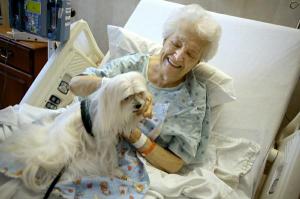Researchers are finding that animals, especially small ones, have shown promise in helping with many conditions, both social and physical:
A Naples Community Hospital has volunteers who bring their pets to visit patients. The animals are specially trained to remain calm and must pass a “Good Citizen” test before they are certified for hospital visits.
Here is a short list of conditions being helped by enlisting cats and dogs
- Pets help Alzheimer’s patients by bringing them back to the present. Specially trained pups can also help alert others that an Alzheimer’s patient has wandered into harm’s way. “Pets can provide a measure of safety to people with the disease,” says Thomas Kirk, a vice president of a chapter of the Alzheimer’s Association.
- Children who suffer from attention deficit disorder (ADD) are able to focus on a pet, which helps them learn to concentrate.
- Mentally ill patients, or those with emotional problems, share a common bond when a cat or dog enters the room. Instead of reacting negatively to one another, it boosts morale and fosters a positive environment.
- Pets are an antidote to depression. Life in a care facility can be boring. A visit from a therapy cat or dog breaks the daily routine and stimulates interest in the world outside.
- Pets provide social interaction. In a health care facility, people come out of their rooms to socialize with the animals and with each other.
- Everyone has the need to touch. Many humans are uncomfortable hugging or touching strangers, even those close to them. Some people are alone and have no hands to hold, no bodies to hug. But rubbing the fur of a cat or dog can provide a stimulation that is sorely lacking. The nonverbal connection is invaluable in the healing process.

No comments:
Post a Comment